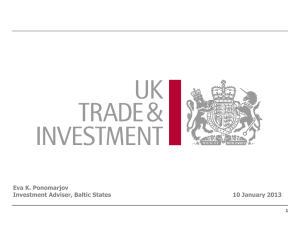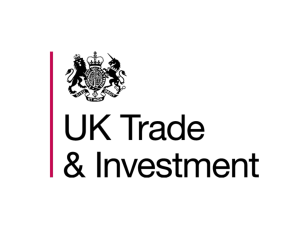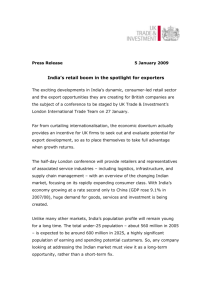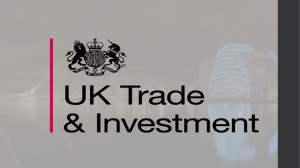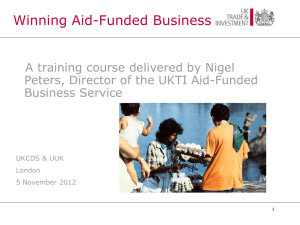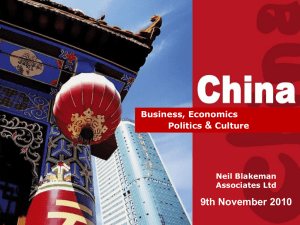Draft Ukie paper on Trade and Investment v5
advertisement
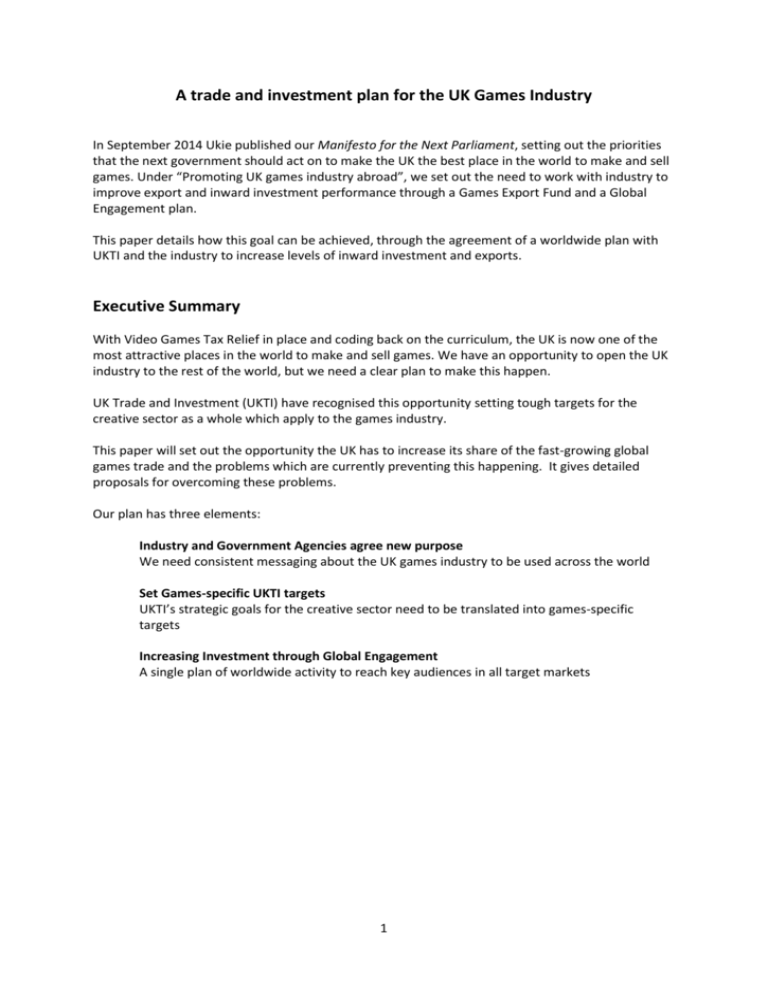
A trade and investment plan for the UK Games Industry In September 2014 Ukie published our Manifesto for the Next Parliament, setting out the priorities that the next government should act on to make the UK the best place in the world to make and sell games. Under “Promoting UK games industry abroad”, we set out the need to work with industry to improve export and inward investment performance through a Games Export Fund and a Global Engagement plan. This paper details how this goal can be achieved, through the agreement of a worldwide plan with UKTI and the industry to increase levels of inward investment and exports. Executive Summary With Video Games Tax Relief in place and coding back on the curriculum, the UK is now one of the most attractive places in the world to make and sell games. We have an opportunity to open the UK industry to the rest of the world, but we need a clear plan to make this happen. UK Trade and Investment (UKTI) have recognised this opportunity setting tough targets for the creative sector as a whole which apply to the games industry. This paper will set out the opportunity the UK has to increase its share of the fast-growing global games trade and the problems which are currently preventing this happening. It gives detailed proposals for overcoming these problems. Our plan has three elements: Industry and Government Agencies agree new purpose We need consistent messaging about the UK games industry to be used across the world Set Games-specific UKTI targets UKTI’s strategic goals for the creative sector need to be translated into games-specific targets Increasing Investment through Global Engagement A single plan of worldwide activity to reach key audiences in all target markets 1 The Opportunity The UK Games industry has incredible potential to create growth and jobs. This is the perfect time to tell the world what a great place this country is to make and sell games. With the right approach it will be possible to capitalise on this potential and significantly increase both inward investment into the UK games sector and exports from it. With proper messaging and targeting we can make it even easier and more attractive for large global companies to invest into the UK, and for small UK companies to do more business in large and growing overseas markets. We are not starting from zero. There is already activity underway across a variety of agencies, and of course there is already awareness around the world of the UK’s legacy as one of the birthplaces of games and a hotbed of talent across the creative industries. The global market for games was estimated at $75.5bn in 2013, and is forecast to reach $102.9bn in 2017, representing a compound annual growth rate of 8%.1 There is an estimated total global market of 1.6 billion people playing games, which is only set to grow. It is clear that there is significant potential for UK companies to serve more of the global games market, and for our sector to win a greater share of global investment glows. A recent paper by Olsberg SPI for the BFI highlighted the following priority markets for the UK games industry2. Exports Inward Inv. Co-Production USA USA Canada China Japan France South Korea China Nordic Countries UKTI Strategy UKTI have recognised the potential of games to increase export and investment flows as part of the broader creative sector. Earlier this year they published a strategy for the UK’s creative industries for the next five years which aims to double service exports to £31 billion, double the number of companies that export, and increase the UK’s share of the global market for inbound foreign direct investment by 50% by 2020.3 UKTI’s strategy was launched with support from Culture Secretary Rt.Hon. Sajid Javid MP and Business Secretary Rt. Hon. Dr. Vince Cable MP, who said: “UKTI’s new international strategy builds on the UK’s global reputation for innovation and quality by setting a goal to double creative exports, double the number of creative companies that trade and establishing the UK as the favoured location for inward investment for the creative industries sector, creating long term jobs and building a stronger economy.” 1 Newzoo online report http://www.newzoo.com/insights/global-games-market-will-reach-102-9-billion-20172/ 2 BFI paper (publication upcoming) 3 UKTI International Strategy for the Creative Industries http://www.thecreativeindustries.co.uk/media/252528/ukti_creative_industries_action_plan_aw_rev_30_spreads.pdf 2 A clear strategy has been set for the creative sector as a whole. Now we need to agree a plan to deliver on these goals for the games industry. UKTI’s international strategy for the creative sector set out overall targets for the next five years, which games have to play their part in meeting. The overall targets were: • Double services exports to £31 billion • Double the number of companies that export – for UKTI this means doubling the numbers of creative companies supported per year from 7,500 companies in 2013/14 to 15,000 per year by 2020 – for industry and trade bodies (Ukie) this means agreeing growth targets • Increase the UK’s share of the global market for inbound foreign direct investment (FDI) by 50 percent by 2020. – Currently 10% of global market, aim is 15% Where UKTI invests money to help UK games companies get overseas and do more business, there is a significant return on this investment for the games industry and so for the UK economy. Ukie have partnered with UKTI to help games companies access Tradeshow Access Programme (TAP) grants to attend six major international tradeshows since March 2012. Over these six shows, 110 games companies have accessed the TAP grants. Across all the games companies that attended these six shows, £87.9 million of potential business was generated. Over the three most recent of these tradeshows, UKTI spent a total of £138,500 in grants and enhanced funding. The potential business generated at these shows by UK games companies was £59.4 million – a return on investment of £429 for every £1 spent.4 At the Gamescom event in Cologne in September 2014, which is one of the global games industry’s biggest annual business-to-business events, six companies attended who told our survey it was “unlikely” or “very unlikely” that they would have attended if they had not secured a TAP grant. These six companies alone generated £4.5 million of potential business between them. These tradeshows are very important for UK developers – they encourage co-production work with overseas developers and are crucial for securing funding and distribution deals. However, they do not encourage the large inward investment projects that Video Games Tax Relief was partially intended to generate. Linking work with IP attaches in target markets Exports need to be underpinned by a strong IP framework. The IP attaché programme has made good progress in recent years, giving UK companies direct help in understanding and accessing emerging markets. We need to ensure this help works for games companies. 4 Figures from Ukie survey of UK games companies attending tradeshows 3 A worldwide plan for trade and investment for the UK games industry requires input and understanding from everyone involved, and the IP attachés should play a central part in this. As part of the global engagement driven by this plan, IP attachés in all the relevant key markets should be given objectives to increase their connections with UK games companies and understanding of the specific barriers that they face in working in their markets. The Problem The UK is not yet capitalising on the opportunity for more investment and exports presented by the games sector. We face several difficulties: No shared purpose – no central plan of activity or agreed messaging Lack of clarity on current activity and funding No agreement on how progress will be measured against UKTI’s strategic goals Unequal support to other screen sectors Reductions in existing funding Industry and government are not yet working together in a coherent way to make this happen. Activity is diffuse and the best initiatives or most exciting prospects for growth have no guarantee of support. Trade and investment activity across this whole sector needs much more coherence than currently exists. Combined, these issues lead to a failure to fully activate Video Games Tax Relief through increased inward investment and exports for SMEs, and ultimately a failure to meet UKTI’s strategic goals. No shared purpose Although the industry has been working hard alongside UKTI and other agencies, such as the IPO, there has not yet been agreement on a single worldwide plan of activity or on consistent messaging to be used by all partners on the strong offer that the UK has in games. Knowledge about the availability and impact of the new Video Games Tax Relief must be improved outside the UK. Lack of clarity on current activity and funding If we are to agree a global plan to increase investment and exports, we need more clarity on what activity is already underway for games, by different industry, trade bodies, UKTI branches and other agencies. No agreement on how progress will be measured against UKTI’s strategic goals We need to know how the targets set out in UKTI’s strategy will be translated for the games industry and, crucially, how progress against them will be measured. Unequal support to other screen sectors Where there has been a concerted effort in raising the profile of a creative sector in the UK, the results have been clear. The strongest example is the UK’s film industry, which since the introduction 4 of Film Tax Relief has seen a concerted effort to increase global awareness. This has included the efforts of UKTI, the British Film Commission, and Film London. As a result, since 2008, inward investment in feature films produced in the UK has increased from £434 million to £868 million in 2013, with a peak of £1,325 million.5 It is clear that, where coordinated support is given to a creative sector with an existing track record of success and clear messaging based on an attractive tax relief, strong results can be seen, but this has yet to occur for games. Putting the spotlight on games This lack of an agreed plan for the games industry has meant less focus on the sector resulting in cuts in funding for trade and investment activity. In the same year that the Video Games Tax Relief comes into force and the new computing curriculum takes effect, this is counter-productive. The Tradeshow Access Programme (TAP) grants that games companies use to attend overseas trade shows have not only been cut significantly from last year, but have in fact been reduced even within year. From funding of £206,700 in 2013 helping 195 games companies to attend major overseas trade shows, TAP grants for the games industry were reduced to £76,200 in 2014. This was reduced even further within the year, to £65,200.6 This means that the number of UK games companies able to attend GDC in San Francisco in March 2015 – the largest business-to-business games event in the world – is fewer than the year before. Failure to reach our potential As a result of this lack of a clear plan and of sufficient funding, we are failing to activate the full potential of the Video Games Tax Relief or see an increase in inward investment and exports that we might expect. UKTI’s strategic targets for the games industry are at risk without further action. 5 British Film Commission press release 30 January 2014 http://www.britishfilmcommission.org.uk/883/ Figures from Ukie partnership with UKTI 6 5 A new plan for games We propose a plan for all worldwide activity on games trade and investment, to ensure that UKTI’s strategic goals are met. Key audiences in target markets: 1. Publishers – companies that fund the creation of games, both in-house and by outside developers on contract; then distribute and market them 2. Developers – companies that make games, either self-funded from previous profits, to a contract from a publisher, or with external investment. Overseas developers can be targeted by UK counterparts for co-production deals 3. Console manufacturers – companies making and selling specialist devices on which games can be played. Biggest current players are Microsoft, Sony and Nintendo, all of which have a large presence in the UK 4. Middleware – companies creating and selling technology helping other companies to make and sell games, for example game engines, audio software, motion capture software. Example firms already in the UK include Unity, Marmalade and bluegfx 5. Distribution platforms – platforms enabling other companies to sell their games to consumers online, such as Steam, the App Store, Google Play or games consoles 6. Investors – as with other parts of the technology and creative industries, these can include Angels, Venture Capitalists, banks, crowdfunding services, and others 7. Support services – business support companies such as legal firms, accountants, PR and marketing firms and others 8. Brands and advertising industry – companies looking to use games and interactive entertainment commissions to advertise their own brands or clients 9. Government and public bodies in expert markets – official representatives and bodies in each market should also be targeted for awareness of the UK games sector 6 10. Press – In order to maximise impact, we should be targeting local press, both general and specialist, to highlight the openness of the UK games industry Industry and Government Agencies agree new purpose What we need To ensure that awareness of the UK games industry’s offering is spread around the world with maximum impact, particularly to ensure that games tax relief is fully activated, we need consistent marketing messages agreed by all partners, including industry, UKTI, the IPO and external agencies. What the industry will do We will partner with UKTI , the IPO and government departments to ensure that these marketing messages are relevant and appealing to games companies across the world, and work to ensure that they are adopted universally. What government should do Government should work with industry to develop these messages and to secure universal commitment to use them, and should provide funding for this process. Set Games-specific UKTI targets What we need If we are to ensure that games contributes to the overall targets, and meets its own needs as set out above, we need to agree a target for the games industry that supports each of these three overall goals. We also need to agree how progress against these games-specific targets will be measured. What industry will do We will engage to ensure that the games-specific targets are relevant to the unique nature of the games industry, and are tough yet realistic to achieve. For the three overall UKTI targets, we recommend the creation of a baseline for current levels of exports, numbers of companies exporting and UK share of inbound FDI and track progress against this up to 2020. We propose that an industry working group be established, chaired by Ukie, to agree appropriate indicators and the process through which they will be measured. What government should do Government should agree the specific targets for games, the benchmarks against which progress will be measured and the process by which this progress will be measured over the five-year timetable in UKTI’s strategy. Funding should be provided to enable this. Increasing Investment through Global Engagement What we need Once consistent marketing messages are agreed between all involved parties, a single coherent plan of global activity should be put in place to ensure the messaging is used as effectively as possible. The focus of this activity plan should be on the agreement of the most important markets, key audiences within those markets, and the activities that will reach them. What industry will do 7 We will work with government to determine the key market and audiences to be targeted. Both inward investment and export agendas benefit from an organised UK presence at international trade shows. Ukie already provides stalls at trade fairs on behalf of the whole industry, providing opportunities for SMEs to take part and benefit from mutually advantageous industry-wide marketing. They allow UK based developers to meet investors and attract publishers to bring video games production to the UK. Further funding would allow a greater industry presence and impact at the most important shows, which have been identified by the sector as E3, GDC, Gamescom, Nordic Game, China Joy, G-Star and Tokyo Game Show. Further platforms for developing investor / developer relationships include: A dedicated B2B event held in the UK would provide a platform for UK companies to do business and attract investment, as well as provide an opportunity to bring hand-picked investors to the UK to familiarise themselves with the UK based industry and infrastructure. Outbound trade missions to target territories would also kick start business relationships, provide a complementary strategy for relationship building and link UK games businesses to potential investors and platforms. Familiarisation trips to clusters across the UK for VIP investors to increase inward investment in the UK games sector. With the biggest games publisher and potential funders being in the USA (chiefly in Los Angeles, New York and Maryland), France, Japan, China and Korea, these territories should be targeted for outbound missions. Ukie currently pays for the UK stands at Gamescom, GDC and Game Connection, investing our own money to ensure UK companies can attend. We will continue to partner with government in this way to ensure that this expanded plan of activity goes ahead. What government should do Government should help secure agreement on the above plan and provide funding to deliver it in partnership with industry. Appendix one sets out draft costings for one full year of the proposed activity. Based on existing experience in games and other creative sectors, we estimate that the total cost to the games industry will be £555,000 per year and to Government (chiefly UKTI) will be £851,000. It is possible that this plan can be delivered without any additional government funding beyond what UKTI already spend on games. There is already games-related activity in several markets through UKTI and other agencies, which may well come to a similar level of spending as set out in this plan. Once greater clarity is afforded on the level and cost of this activity, we will be able to assess how much, if any, additional funding is required, but we believe it will be low. 8 Appendix: draft costings for activity plan Activity £ ‘000s UKTI TAP grants - exports, enhanced funding and other contribution for 7 overseas trade shows - Gamescom, GDC, Game Connection, Nordic games, China Joy, G Star Korea, E3 - Includes £80k for Inward Investment £390 Outbound missions x 2 and Inbound familiarisation trips x2 £100 Additional resource - Infrastructure support £45 Research (markets and success) £20 Games Staffing x3 (1 x Senior, 1 x support, 1 x international post) This includes all staff overheads. £191 Marketing £45 UK B2B event £60 CE / L&P / other Total other funding £851 UKIE/ industry resource (trade stands x7 and staff, travel and admin costs) £555 Total games industry resource £555 Total £1,406 9

